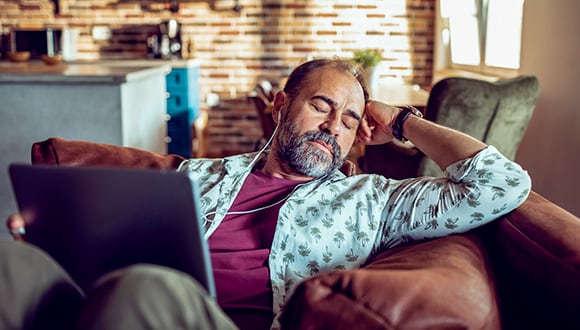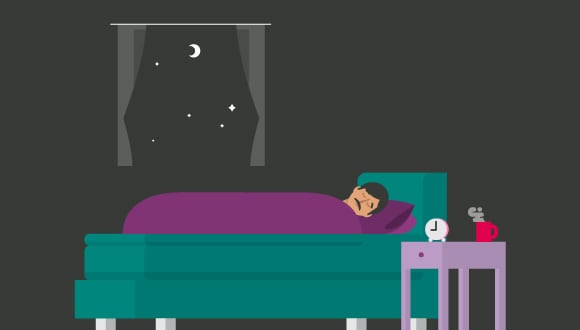Alcohol and sleep: what are the possible side effects?
Updated October 2023 | 4 min read
Based on article first published by Hello Sunday Morning
Do you often have a drink to help you nod off? Alcohol and sleep don't mix. Find out what the possible side effects are, how it can impact the quality of your sleep in the long term and other health risks you need to be aware of.
If you enjoy a few drinks at night, you might think one of the benefits of alcohol is helping you get to sleep. It might surprise you to know that you’re likely setting yourself up for a restless night. After drinking just a small amount, you’re more likely to wake up feeling tired – even after eight hours in bed.
Given good-quality sleep is crucial to maintaining your physical and mental wellbeing, deciding whether to drink or not is important.
Worrying about broken sleep can be a big part of your relationship with alcohol – if you stop drinking or cut back, will you suffer for it at night?
Research from the Alcohol and Drug Foundation shows alcohol is detrimental to sleep and, while a change in your drinking habits might cause some initial disruption to the quality of your shut-eye, reducing or cutting out alcohol altogether is likely to have positive effects in the long term.
How does alcohol affect sleep?
Depending on how much you drink and when, alcohol can have either a stimulating or sedating effect on your sleep cycle, specifically your Rapid Eye Movement (REM) sleep – the phase in which your brain is most active.
Crucially, REM sleep is when you’re most likely to dream and is associated with locking in memories.
So when you use alcohol to sleep, it can result in disrupted cycles and less restful shut-eye.
Even those ‘happy hour’ drinks can make for an unhappy night of rest. Studies show that drinking alcohol can lead to a lack of sleep as much as six hours later.

Does a little alcohol help you sleep?
Many people use alcohol to help them get to sleep. But the more you drink, the more alcohol it takes to reach the same point of relaxation and sleepiness – and that’s when it can become an issue.
With regular use, alcohol can lose its effectiveness as a sedative, but still retain its sleep-disturbing properties later in the night or early morning. This can result in a lack of alertness and concentration the next day.
Why am I not sleeping after giving up alcohol?
When regular drinkers cut back on alcohol, they often feel it most at night – from trouble sleeping and staying asleep, to not feeling rested the next morning. This can be a result of the withdrawal effects and the brain adjusting to not having alcohol as a regular sedative.
If you want to stop drinking or cut back, but you’re worried about the potential disruption to your sleep, remember it’s usually only temporary.
A lack of sleep can make alcohol appeal harder to resist, so it’s a good idea to chat to your GP and discuss how to manage this short-term challenge in a way that works for you.
Most people who cut back or give up alcohol altogether find their sleep quality improves over time.
As your brain adjusts to living without alcohol, your sleep patterns begin to balance out, your REM sleep improves and the early morning wake-ups start to lessen.
How to improve sleep without drinking
There are many ways you can improve your quality of sleep that don’t carry the health risks drinking does, including:
- having a regular bedtime routine, including going to bed and waking at the same time
- having a warm drink or shower just before you go to bed changes your core body temperature and signals to the brain that it’s time to sleep
- putting away digital devices at least an hour before you want to go to sleep
- making sure your sleep environment is dark and quiet.

Help is here for a better night's sleep
We want to help you build better sleep habits and improve your overall wellbeing, so we’ve partnered with Sleepfit Solutions, who deliver an app that can help you identify sleep issues, recommend improvements and give you access to personalised tools.
And, eligible HCF members with hospital or extras cover* can get a free 12-month Sleepfit subscription. Help for a better night's sleep – that’s Uncommon Care.
What if I can’t sleep without alcohol?
If you can't sleep without alcohol, you may want to reach out to additional support services to help you figure out why and start establishing healthy sleeping habits. Speaking to your doctor is a good place to start.
You can also reset drinking habits with the Daybreak app^, Hello Sunday Morning’s online behaviour change program giving you access to 24/7 digital support. The program connects you anonymously with a like-minded online community trying to change their relationship with alcohol.
The Daybreak app is fully subsidised by the Australian Department of Health, which means all Australians get free access.
HCF members may also have access to additional mental health support.
Download the Daybreak app on the App Store or Google Play.
Where to find more help for alcohol support, counselling and information:
If you're struggling, and need to speak to someone now, call Lifeline on 13 11 14.
Related articles
How to break the alcohol habit
Here are some signs that you might be drinking too much, and what you can do about it.
Are you drinking too much?
Alcohol often feels like a normal part of life, so how do you know when you're drinking too much?
Alcohol and depression in men
The growing link between men, alcohol and mental health is revealing some shocking effects.
FACTS ABOUT ALCOHOL CONSUMPTION FOR WOMEN
Everything women need to know about having a healthy relationship with alcohol.
IMPORTANT INFORMATION
* Eligibility criteria apply. See hcf.com.au/sleepfit for details.
^ You should make your own enquiries to determine whether this service is suitable for you. If you decide to use this service, it'll be on the basis that HCF won't be responsible, and you won't hold HCF responsible, for any liability that may arise from that use.
This communication contains information which is copyright to The Hospitals Contribution Fund of Australia Limited (HCF). It should not be copied, disclosed or distributed without the authority of HCF. Except as required by law, HCF does not represent, warrant and/or guarantee that this communication is free from errors, virus, interception or interference. All reasonable efforts have been taken to ensure the accuracy of material contained on this website. It’s not intended that this website be comprehensive or render advice. HCF members should rely on authoritative advice they seek from qualified practitioners in the health and medical fields as the information provided on this website is general information only and may not be suitable to individual circumstances or health needs. Please check with your health professional before making any dietary, medical or other health decisions as a result of reading this website.